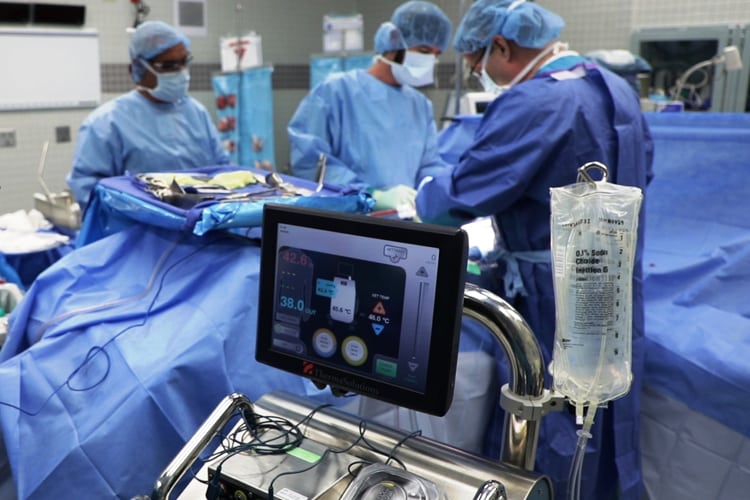Abrazo Central Campus is now offering Hyperthermic Intraperitoneal Chemotherapy (HIPEC) as a treatment option for appropriate patients with advanced abdominal and ovarian cancers.
Developed as an effective treatment for cancers that have spread to the abdominal lining, the HIPEC procedure involves surgically removing all visible tumors and then bathing the abdomen with high dose, heated chemotherapy.
Patients with advanced abdominal cancers have received the HIPEC procedure at Abrazo Central Campus since April 2018, and the hospital’s multidisciplinary surgical team treated their first HIPEC ovarian cancer patient in July.
During the HIPEC treatment, a heated sterile solution containing a chemotherapeutic agent is continuously circulated throughout the abdominal cavity, for 90 minutes. The entire procedure including surgery can last several hours.
“This is an opportunity to offer hope to patients with advanced-stage malignancies that have disease limited to the abdominal cavity. The idea is to attempt to or remove or kill any remaining cancer cells,” said Ronald Chamberlain, MD, MPA, FACS, lead surgical oncologist on the Abrazo Central Campus medical staff. “The procedure improves drug penetration and absorption into the cancer cells while minimizing the chemo exposure to the rest of the body.”
Cytoreductive surgery, or removal of all visible tumors throughout the abdominal cavity (peritoneum), combined with HIPEC is a comprehensive surgical treatment for carefully selected patients with malignancies arising from or confined to the peritoneal cavity, explained Dr. Chamberlain.
Clinical trial results published in the Jan. 18, 2018 edition of the New England Journal of Medicine demonstrated a significant patient benefit when HIPEC is combined with cytoreductive surgery in ovarian cancer patients.
“What the trial found were improved progression free survival as well as improved overall survival in stage III ovarian cancer patients who received HIPEC,” said Bradley Monk, MD, a gynecologic oncologist on the medical staff at Abrazo Central Campus. Dr. Monk is a professor at Creighton and the University of Arizona, Phoenix, with nearly 300 peer-reviewed publications in medical literature.
“We were very encouraged by the study results published in NEJM and believe HIPEC is a viable option for many women seeking treatment for advanced ovarian cancer. Importantly, this therapy is now readily available for those battling cancer here in Arizona,” said Dr. Monk.
HIPEC also can be an option for treating cancer that has spread to the lining surfaces of the abdominal cavity from primary colorectal cancer, gastric cancer, appendiceal cancer or from mesothelioma.
“Abrazo Central Campus continues to strengthen its surgical oncology services with the addition of the HIPEC program, and now expanding to offer gynecology oncology HIPEC,” said Abrazo CEO Frank Molinaro. “These are highly specialized capabilities that reflect Abrazo’s commitment to the Central Campus and providing high quality services for our community.”




